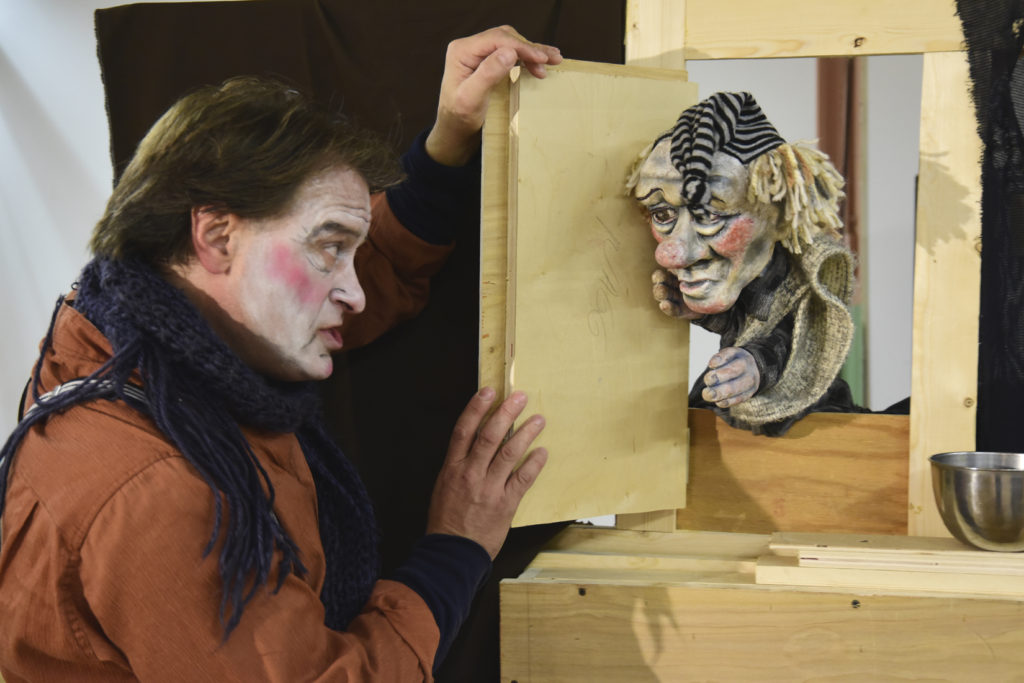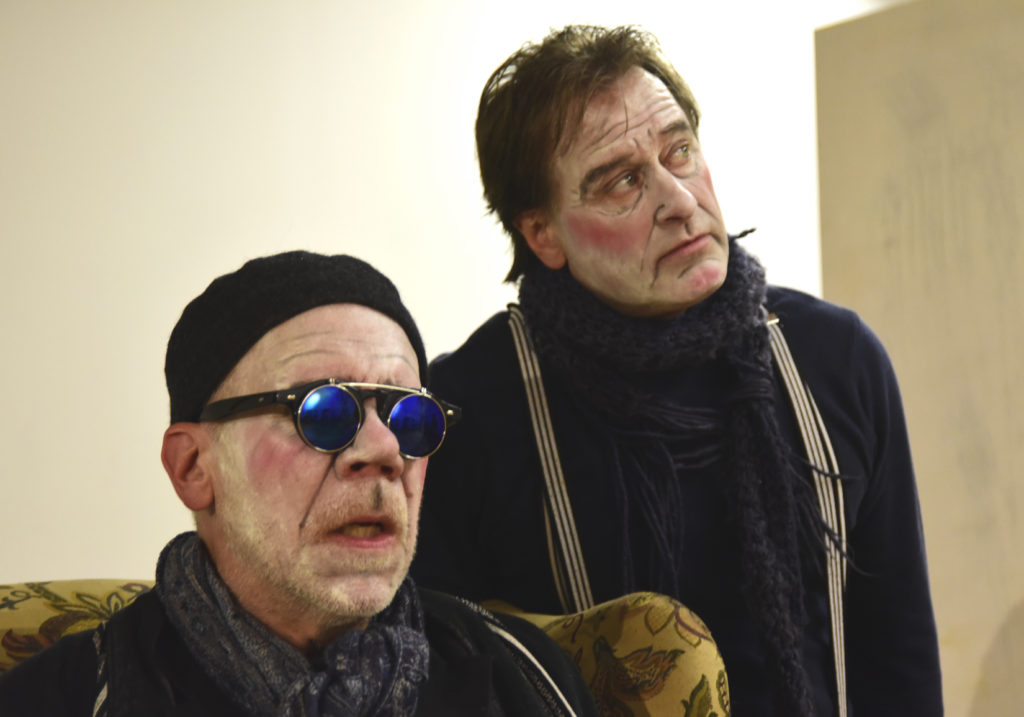The story goes that Samuel Beckett was walking through a London park with a friend on a glorious spring morning when his companion exclaimed, “Isn’t this just the kind of day that makes you glad to be alive?” To which Beckett replied, “Oh, I don’t think I’d go that far.”
For me, that moment of self-satire goes a long way toward explaining the connection between Beckett’s famously gloomy view of the human condition and his less-well-known love of vaudeville and silent-movie clowns. There’s a wry humor mixed with existential angst in the repetitive routines of the two tramps endlessly awaiting the arrival of the elusive (and illusive) Godot.
Similarly, there’s a distinct Laurel and Hardy relationship between the protagonists of Beckett’s Endgame, Clov and Hamm.
The Endgame Project, playing this weekend in Northampton, is a three-way collaboration between two Valley-based paragons of physical theater, Serious Play! and Pilgrim Theater, and Sandglass Theater of Putney, Vermont, the world-renowned puppetry troupe. It’s the product of a two-year development process led by Serious Play’s Sheryl Stoodley. Since its premiere a year ago, the piece “has deepened and refined, and we have further crafted the set,” Stoodley says.
This one-act echo of Waiting for Godot finds two men in a house that’s surrounded by an apocalyptic panorama – a bleak, ruined landscape in which all of nature is disintegrating. They are master and servant, Hamm a blind, impatient tyrant confined to a wheelchair, Clov submissive and resentful. From time to time another pair, Hamm’s aged parents, pop in (literally) to complain and reminisce. In Beckett’s script, these two, Nagg and Nell, appear from inside trash cans. Here, they peep out of a cardboard junk-pile. And they are puppets.
The puppet characters were conceived as counterparts to Punch and Judy, “that classic pair of English hand puppets who live in both strife and love, whose language is physical action, and who, like Beckett’s Nagg and Nell, play their story in the face of death,” according to Sandglass’ Eric Bass. They’re descendants but not imitations of those archetypes, manipulated like their forebears by a single puppeteer, David Regan. There’s also a play-within-the-puppet-play, where a shaggy dog story is enacted by Nagg with stick figures.
“Collaboration is hard work,” Stoodley explains, but she welcomed the challenge of the cross-disciplinary partnership with a puppet troupe. “I quickly realized that puppets are beings that develop alongside their creator, the puppeteer. At first we used old Punch and Judy-style puppets, but gradually each puppet character took on a life of its own, and a specifically designed Nagg and Nell emerged. When puppets enter a stage, the entire stage world is altered, affecting puppets and actors alike.”
Beckett was a passionate fan of silent-movie slapstick — he even wrote a short film, called Film, starring Buster Keaton. Endgame is full of Keatonesque routines, enacted by Clov, including a rib-tickling sequence involving a ladder, a spyglass and a high window. Kermit Dunkelberg, of Pilgrim Theater, performs them with the weary doggedness of those straight-faced cinema clowns, evoking not only Keaton and Chaplin but Stan Laurel’s sad, good-natured forbearance under Oliver Hardy’s bombastic ridicule.
Rand Foerster’s Hamm is peremptory, unforgiving, downright cruel to his powerless parents, but utterly helpless himself. Blind and immobile, he’s dependent on Clov, who is constantly on the verge of quitting but never quite makes it out the door.
Which is Beckett all over. Like Godot’s ever-expectant pair, these two exist in a recursive daily cycle of hope and despair. Life, in Beckett’s view, is merely death’s waiting room — “a difficult birth astride the grave,” or as Hamm says, “The end is in the beginning, and yet you go on.”
You go on. That’s not only the imperative but the triumph, the plucky persistence of the puppet and the clown in the face of an absurd and exasperating world. “And in present-day Trump America, absurdism is the norm!” Stoodley exclaims.
Indeed. More than ever, we need pluck and courage to face today’s bleak social/political landscape. This funny, touching, profound production gives us perspective – and, perhaps paradoxically, hope.
Friday-Saturday, March 24-25, 8 p.m., in STUDIO4, 25 Main St. 4th floor (Fitzwilly’s building), Northampton. Suitable for ages 14 and up. Tickets $18/$15 students & seniors at brownpapertickets.com.
Photos by Ellen Augarten
Chris Rohmann is at StageStruck@crocker.com and valleyadvocate.com/author/chris-rohmann.




